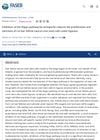Construction of Tissue-Engineered Nerve Conduits Seeded with Neurons Derived from Hair-Follicle Neural Crest Stem Cells
January 2016
in “
Methods in molecular biology
”
TLDR Neurons from hair follicles can help repair damaged nerves.
The study described the construction of tissue-engineered nerve conduits using neurons derived from hair-follicle neural crest stem cells (hfNCSCs) to repair peripheral nerve injuries with long defects. These hfNCSCs-derived neurons were seeded into acellular sciatic nerve scaffolds from beagles, which maintained intact collagen structure, biocompatibility, and low toxicity. The goal was to develop a novel therapeutic approach for repairing long-distance peripheral nerve injuries.


